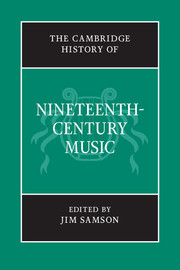Book contents
- Frontmatter
- Part One 1800–1850
- 1 The musical work and nineteenth-century history
- 2 Music And the rise of aesthetics
- 3 The profession of music
- 4 The opera industry
- 5 The construction of Beethoven
- 6 Music and the poetic
- 7 The invention of tradition
- 8 Choral music
- 9 The consumption of music
- 10 The great composer
- Part Two 1850–1900
- Chronology
- Institutions
- Personalia
- Index
- References
7 - The invention of tradition
from Part One - 1800–1850
Published online by Cambridge University Press: 28 March 2008
- Frontmatter
- Part One 1800–1850
- 1 The musical work and nineteenth-century history
- 2 Music And the rise of aesthetics
- 3 The profession of music
- 4 The opera industry
- 5 The construction of Beethoven
- 6 Music and the poetic
- 7 The invention of tradition
- 8 Choral music
- 9 The consumption of music
- 10 The great composer
- Part Two 1850–1900
- Chronology
- Institutions
- Personalia
- Index
- References
Summary
An imagined past
Whenever I was in Berlin, I would seldom miss Möser’s quartet evenings. For me, such artistic presentations were always the most intelligible forum for appreciating instrumental music, in which one heard four reasonable people conversing, as it were, believed their discourse to be profitable and became acquainted with the individuality of the instruments. Goethes Briefe Band IV: Briefe der Jahre 1821–1832.’ Textkritisch durchgesehen und mit Anmerkungen versehen von Karl Robert Mandelkow (Hamburg, 1967), no. 1443.
Goethe’s letter to Carl Friedrich Zelter (9 November 1829) is sometimes cited as an idealisation of the Classical string quartet, in which this genre is treated as a musical embodiment of civilised Enlightenment conversation between intellectual peers, the ‘thread’ of the conversation passing effortlessly through the entire musical ensemble. In other respects Goethe’s comment sheds light upon the relationship between early Romantic instrumental music – specifically chamber music in this context – and its immediate Classical past. The evocation of an ideal mode of Enlightenment conversation suggests a nostalgia for a past, even if that past were nothing but an imagined construction (that is, one of many such possible pasts), in relation to which the early Romantic present might be situated. Although he mentions no specific event, either public or private, nor even a specific repertory, it is clear enough that what Goethe had in mind was one of a series of quartet performances organised in Berlin by Karl Möser, at first informally, as an outgrowth of a tradition of chamber and orchestral concerts he had initiated in 1812, and continued on a more permanent footing from the mid-1820s.
- Type
- Chapter
- Information
- The Cambridge History of Nineteenth-Century Music , pp. 178 - 212Publisher: Cambridge University PressPrint publication year: 2001
References
- 4
- Cited by

